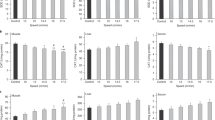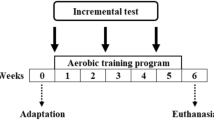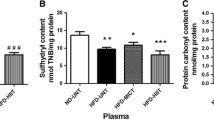Abstract
The present study investigates the effects of incremental exercise test on muscular oxidative metabolism. Thirty-six 2-month-old male Wistar rats were distributed in seven groups that performed exercise at different levels: first level (control), second level (0.6 km/h), third level (0.6 and 0.8 km/h), fourth level (0.6, 0.8 and 1.0 km/h), fifth level (0.6, 0.8, 1.0 and 1.2 km/h), sixth level (0.6, 0.8, 1.0, 1.2 and 1.4 km/h), and seventh level (0.6, 0.8, 1.0, 1.2, 1.4 and 1.6 km/h). At the end of the exercise challenge, level of blood lactate (BL), glycogen content (MG), creatine kinase (CK), complexes (CI, CII, CIII, CIV), oxidative damage, succinate dehydrogenase (SDH), cytochrome c oxidase as well as antioxidant enzymes (SOD and CAT) expression were measured. The speed of 1.0 km/h increased BL level, while 1.2 km/h decreased MG and increased serum CK. Increased SDH expression was observed after intensity levels 6 and 7, and cytochrome c oxidase expression increased after levels 5, 6 and 7, in comparison with lower intensity levels, ETC enzyme activities increased when exercise was applied at intensities of 0.8 km/h (CI), 1.0 km/h (CII and CIII), and 1.2 km/h (CIV). The increase in SOD expression did not occur as observed for superoxide production, except for rats that underwent exercise at level 7, but CAT expression increased significantly in all levels, starting from level 3. Our results show interesting alterations in the muscular metabolism parameters, and suggest a differential response of muscle oxidative metabolism when intense exercise is applied at different speeds.





Similar content being viewed by others
References
Aguiló A, Tauler P, Fuentespina E, Tur JA, Córdova A, Pons A (2005) Antioxidant response to oxidative stress induced by exhaustive exercise. Physiol Behav 84:1–7
Booth FW, Baldwin KM (1996) Muscle plasticity: energy demand and supply processes. In: Handbook of physiology exercise: regulation and integration of multiple systems, chap 3, American Physiological Society, Bethesda, pp 1075–1123
Boveris A, Navarro A (2008) Systemic and mitochondrial adaptive responses to moderate exercise in rodents. Free Radic Biol Med 44:224–229
Bradford MM (1976) A rapid and sensitive method for the quantitation of microgram quantities of protein utilizing the principle of protein-dye binding. Anal Biochem 72:248–254
Calvo JA, Daniels TG, Wang X, Paul A, Lin J, Spiegelman BM, Stevenson SC, Rangwala SM (2008) Muscle-specific expression of PPARgamma coactivator-1alpha improves exercise performance and increases peak oxygen uptake. J Appl Physiol 104:1304–1312
Cardinet III GH (1997) Skeletal muscle function. In: Kaneko JJ, Harvey JW, Bruss ML (eds) Clinical biochemistry of domestic animals, 5th edn. Academic, San Diego
Carter SL, Rennie CD, Hamilton SJ, Tarnopolsky MA (2001) Changes in skeletal muscle in males and females following endurance training. Can J Physiol Pharmacol 79:386–392
Cassina A, Radi R (1996) Differential inhibitory action of nitric oxide and peroxynitrite on mitochondrial electron transport. Arch Biochem Biophys 328:309–316
Chilibeck PD, Bell GJ, Socha T, Martin TP (1998) The effect of aerobic exercise training on the distribution of succinate dehydrogenase activity throughout muscle fibers. Can J Appl Physiol 23:74–86
Draper HH, Hadley M (1990) A review of recent studies on the metabolism of exogenous and endogenous malondialdehyde. Xen 20:901–907
Duncan Jr, Prasse KW (1986) Veterinary laboratory medicine, clinical pathology, 2nd edn. Iowa State University, Ames, p 285
Essig DA (1996) Contractile activity-induced mitochondrial biogenesis in skeletal muscle. Exerc Sport Sci Rev 24:289–319
Favier RJ, Constable SH, Chen M, Holloszy JO (1986) Endurance exercise training reduces lactate production. J Appl Physiol 61:885–889
Ferreira JC, Rolim NP, Bartholomeu JB, Gobatto CA, Kokubun E, Brum PC (2007) Maximal lactate steady state in running mice: effect of exercise training. Clin Exp Pharmacol Physiol 34:760–765
Finaud J, Lac G, Filaire E (2006) Oxidative stress: relationship with exercise and training. Sports Med 36:327–358
Fischer JC, Ruitenbeek W, Berden JA, Trijbels JM, Veerkamp JH, Stadhouders AM, Sengers RC, Janssen AJ (1985) Differential investigation of the capacity of succinate oxidation in human skeletal muscle. Clin Chim Acta 29:23–36
Fisher-Wellman K, Bloomer RJ (2009) Acute exercise and oxidative stress: a 30 year history. Dyn Med 3:1–25
Gava NS, Veras-Silva AS, Negrão CE, Krieger EM (1995) Low-intensity exercise training attenuates cardiac beta-adrenergic tone during exercise in spontaneously hypertensive rats. Hypertension 26:1129–1133
Geng T, Li P, Okutsu M, Yin X, Kwek J, Zhang M, Yan Z (2010) PGC-1alpha plays a functional role in exercise-induced mitochondrial biogenesis and angiogenesis but not fiber-type transformation in mouse skeletal muscle. Am J Physiol Cell Physiol 298:C572–C579
Green HJ, Dahly A, Shoemaker K, Goreham C, Bombardier E, Ball-Burnett M (1999) Serial effects of high-resistance and prolonged endurance training on Na+–K+ pump concentration and enzymatic activities in human vastus lateralis. Acta Physiol Scand 165:177–184
Green HJ, Bombardier EB, Duhamel TA, Holloway GP, Tupling AR, Ouyang J (2008) Acute responses in muscle mitochondrial and cytosolic enzyme activities during heavy intermittent exercise. J Appl Physiol 104:931–937
Halliwell B, Gutteridge JMC (2007) Free radical in biology and medicine, 2nd edn. University Press, Oxford
Hawley JA (2002) Adaptations of skeletal muscle to prolonged, intense endurance training. Clin Exp Pharmacol Physiol 29:218–222
Holloszy JO (1967) Biochemical adaptations in muscle. Effects of exercise on mitochondrial oxygen uptake and respiratory enzyme activity in skeletal muscle. J Biol Chem 242:2278–2282
Holloszy JO, Coyle EF (1984) Adaptations of skeletal muscle to endurance exercise and their metabolic consequences. J Appl Physiol 56:831–838 (review)
Holloway GP, Bezaire V, Heigenhauser GJF, Tandon NN, Glatz JFC, Luiken JJFP, Bonen A, Spriet LL (2006) Mitochondrial long chain fatty acid oxidation, fatty acid translocase/CD36 content and carnitine palmitoyltransferase I activity in human skeletal muscle during aerobic exercise. J Physiol 571:201–210
Jackson MJ (2005) Reactive oxygen species and redox-regulation of skeletal muscle adaptations to exercise. Philos Trans R Soc Lond B Biol Sci 360:2285–2291
Kayatekin BM, Gönenç S, Açikgöz O, Uysal N, Dayt A (2002) Effects of sprint exercise on oxidative stress in skeletal muscle and liver. Eur J Appl Physiol 87:141–144
Kjaer M (1998) Adrenal medulla and exercise training. Eur J Appl Physiol Occup Physiol 77:195–199
Kourie JI (1998) Interaction of reactive oxygen species with ion transport mechanisms. Am J Physiol 275:1–24
Koval JA, Defronzo RA, O’Doherty RM, Printz R, Ardehali H, Granner DK, Mandarino LJ (1998) Regulation of hexokinase II activity and expression in human muscle by moderate exercise. Am J Physiol 274:E304–E308
Kraniou Y, Cameron-Smith D, Misso M, Collier G, Hargreaves M (2000) Effects of exercise on GLUT-4 and glycogenin in gene expression in human skeletal muscle. J Appl Physiol 88:794–796
Krieger DA, Tate CA, McMillin-Wood J, Booth FW (1980) Populations of rat skeletal muscle mitochondria after exercise and immobilization. J Appl Physiol 48:23–28
Laemmli UK (1970) Cleavage of structural proteins during the assembly of the head of bacteriophage T4. Nature 227:680–685
Lee J, Clarkson PM (2003) Plasma creatine kinase activity and glutathione after eccentric exercise. Med Sci Sports Exerc 35:930–936
Leek BT, Mudaliar SR, Henry R, Mathieu-Costello O, Richardson RS (2001) Effect of acute exercise on citrate synthase activity in trained and untrained human muscle. Am J Physiol Regul Integr Comp Physiol 280:R441–R447
Levine RL, Garland D, Oliver CN, Amici A, Climent I, Lenz AG, Ahn BW, Stadtman ER (1990) Determination of carbonyl content in oxidatively modified proteins. Methods Enzymol 186:464–478
Lowry OH, Rosebrough NJ, Farr AL, Randall RJ (1951) Protein measurement with the Folin’s phenol reagent. J Biol Chem 193:265–275
Mastaloudis A, Hopkins MorrowJD, DW DevarajS, Traber MG (2004) Antioxidant supplementation prevents exercise-induced lipid peroxidation, but not inflammation, in ultramarathon runners. Free Radic Biol Med 36:1329–1341
Mastaloudis A, Traber MG, Carstensen K, Widrick JJ (2006) Antioxidants did not prevent muscle damage in response to an ultramarathon run. Med Sci Sports Exerc 38:72–80
Menshikova EV, Ritov VB, Ferrell RE, Azuma K, Goodpaster BH, Kelley DE (2007) Characteristics of skeletal muscle mitochondrial biogenesis induced by moderate-intensity exercise and weight loss in obesity. J Appl Physiol 103:21–27
Millet GY, Millet GP, Lattier G, Maffiuletti NA, Candau R (2003) Alteration of neuromuscular function after a prolonged road cycling race. Int J Sports Med 24:190–194
Mitchell P (1966) Chemiosmotic coupling in oxidative and photosynthetic phosphorylation. Biol Rev 41:445–502
Molnar AM, Alves AA, Pereira-da-Silva L, Macedo DV, Dabbeni-Sala F (2004) Evaluation by blue native polyacrylamide electrophoresis colorimetric staining of the effects of physical exercise on the activities of mitochondrial complexes in rat muscle. Braz J Med Biol Res 37:939–947
Olert ED, Cross BM, Mcwillians AA (1993) Guide to care and use of experimental animals, 2nd edn. Canadian Council on Animal, Ottawa
Olesen J, Kiilerich K, Pilegaard H (2010) PGC-1alpha-mediated adaptations in skeletal muscle. Pflugers Arch 460:153–162
Parise G, Brose AN, Tarnopolsky MA (2005) Resistance exercise training decreases oxidative damage to DNA and increases cytochrome oxidase activity in older adults. Exp Gerontol 40:173–180
Pette D, Dölken G (1975) Some aspects of regulation of enzyme levels in muscle energy-supplying metabolism. Adv Enzyme Regul 13, 355–378 (review)
Pinho RA, Andrades ME, Oliveira MR, Pirola AC, Zago MS, Silveira PC, Dal-Pizzol F, Moreira JC (2006) Imbalance in SOD/CAT activities in rat skeletal muscles submitted to treadmill training exercise. Cell Biol Int 30:848–853
Poderoso JJ, Carreras MC, Cl Lisdero (1996) Nitric oxide inhibits electron transfer and increases superoxide radical production in rat heart mitochondrial and submitochondrial particles. Arch Biochem Biophys 328:85–92
Powers SK, Jackson MJ (2008) Exercise-induced oxidative stress: cellular mechanisms and impact on muscle force production. Physiol Rev 88, 1243–1276 (review)
Reid MB (2008) Free radicals and muscle fatigue: of ROS, canaries, and the IOC. Free Radic Biol Med 44, 169–179 (review)
Rustin P, Chretien D, Bourgeron T, Gérard B, Rötig A, Saudubray JM, Munnich A (1994) Biochemical and molecular investigations in respiratory chain deficiencies. Clin Chim Acta 228:35–51
Sentürk UK, Gündüz F, Kuru O, Aktekin MR, Kipmen D, Yalçin O, Bor-Küçükatay M, Yeşilkaya A, Başkurt OK (2001) Exercise-induced oxidative stress affects erythrocytes in sedentary rats but not exercise-trained rats. J Appl Physiol 91:1999–2004
Silva LA, Silveira PC, Pinho CA, Tuon T, Dal Pizzol F, Pinho RA (2008) N-acetylcysteine supplementation and oxidative damage and inflammatory response after eccentric exercise. Int J Sport Nutr Exerc Metab 18:379–388
Tonkonogi M, Sahlin K (2002) Physical exercise and mitochondrial function in human skeletal muscle. Exerc Sport Sci Rev 30:129–137
Tonkonogi M, Harris B, Sahlin K (1997) Increased activity of citrate synthase in human skeletal muscle after a single bout of prolonged exercise. Acta Physiol Scand 161:435–436
Vaynman S, Ying Z, Wu A, Gomes-Pinilla F (2006) Coupling energy metabolism with a mechanism to support brain-derived neurotrophic factor-mediated synaptic plasticity. Neuroscience 4:1221–1234
Acknowledgments
This research was supported by grants from CNPq/MCT (Brazil), CAPES/MEC (Brazil) and UNESC (Brazil).
Author information
Authors and Affiliations
Corresponding author
Additional information
Communicated by Susan A. Ward.
Rights and permissions
About this article
Cite this article
Pinho, R.A., Silva, L.D., Pinho, C.A. et al. Alterations in muscular oxidative metabolism parameters in incremental treadmill exercise test in untrained rats. Eur J Appl Physiol 112, 387–396 (2012). https://doi.org/10.1007/s00421-011-1986-0
Received:
Accepted:
Published:
Issue Date:
DOI: https://doi.org/10.1007/s00421-011-1986-0




